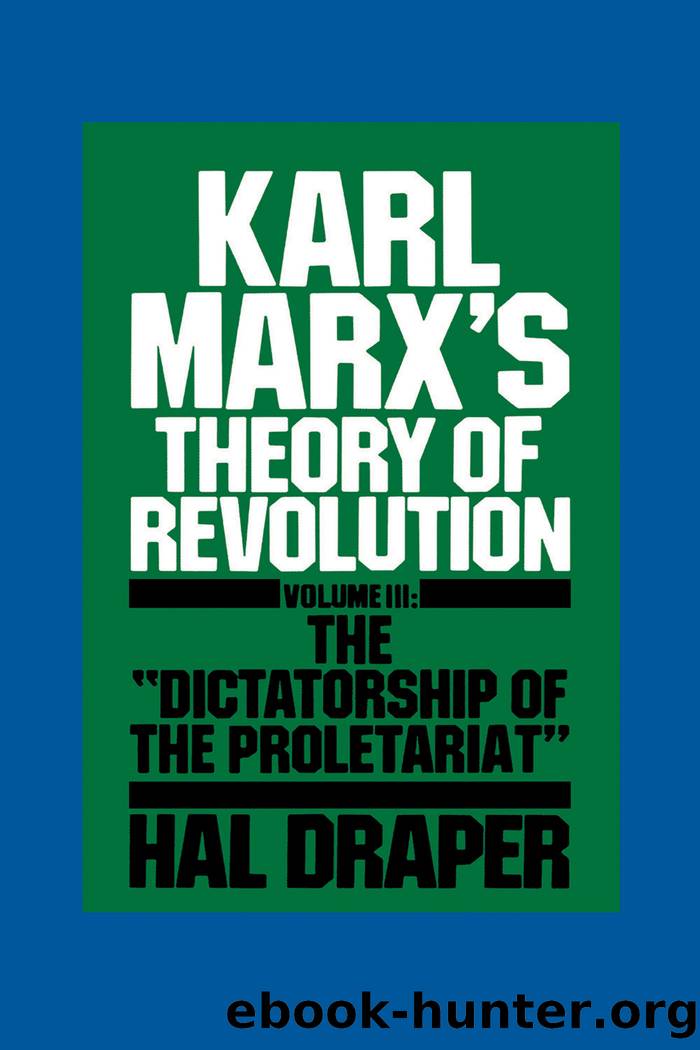Karl Marx's Theory of Revolution III by Hal Draper

Author:Hal Draper [Draper, Hal]
Language: eng
Format: epub
Tags: Politics, Communism; Post-Communism & Socialism, Political Science, Political Ideologies
ISBN: 9780853456735
Google: A0hRBAAAQBAJ
Goodreads: 184161
Publisher: Monthly Review Press
Published: 1986-01-01T00:00:00+00:00
2. WEYDEMEYERâS ARTICLE ON âDICTATORSHIPâ
Immediately after his arrival in New York on November 7, 1851, Weydemeyer began writing for the radical German-American press. He wrote his first article for what he considered the best of the local socialist publications, the Turn-Zeitung of New York, a semimonthly that had been only recently founded by the Turnerbund. Weydemeyerâs article appeared in the third number, dated January 1,1852, which also included the first installment of Engelsâ Peasant War in Germany (reprinted from the NRZ Revue) as well as Weydemeyerâs announcement of his own forthcoming weekly.
The title of Weydemeyerâs article was âDie Diktatur des Proletariatsâ (The Dictatorship of the Proletariat). This was no doubt the only article with a title of this sort until the twentieth century.
Yet, except glancingly in the last paragraph, the article had nothing to say about the âdictatorshipâ of the proletariat It was about the rule of the proletariat as the aim expounded in the Communist Manifesto. Most of the article is a condensation of a good part of the Manifesto.
There was a specific reason why an exposition of the Manifesto would have been on Weydemeyerâs mind. Shortly before he sailed into New York harbor, the Manifesto had appeared for the first time in an American publication, even if in unfinished form. Weitlingâs Republik der Arbeiter had started running installments on October 11, and cut them off in mid-course on November 8 (the day after Weydemeyerâs arrival). Since Weitling was furiously anti-Marx and had printed attacks on Marx only weeks before, this was a surprising development; but what had actually happened was that Weitlingâs departure from New York on a cross-country propaganda trip was utilized by the substitute editor (who has not been identified). The Manifesto installments stopped abruptly when Weitling got back.3
This was not the only evidence of interest in the Manifesto. Eduard Ignaz Koch, an ex-priest who had taken part in the revolution in Germany, emigrated in 1850, and turned to journalism in New York, had recently written Marx asking for a bundle of copies of the Manifesto. Marx sent him a batch of twenty, plus the Macfarlane English translation of 1850, suggesting that he publish the translation in pamphlet form. Thenâno word from Koch. Even while Weydemeyer was still on the high seas, Marx shot him a letter with some urgent publishing proposals, including the suggestion that Weydemeyer rescue the Macfarlane translation from Koch and carry out the pamphlet publication plan.4 Weydemeyer found this letter awaiting him in New York. On December 1 he wrote back that he would try to get the English Manifesto edition published through New York Daily Tribune editor Charles A. Dana; but in fact nothing ever came of the project.5
Weydemeyer must have started writing his Turn-Zeitung article about the same time he was trying to accomplish this plan. As mentioned, he expounded much of the Manifestoâwith some trimmings of his own: development of capitalism, modern industry, class struggle, role of the petty-bourgeoisie and other classes, etc.*
In view of this background, one aspect of his article is puzzling.
Download
This site does not store any files on its server. We only index and link to content provided by other sites. Please contact the content providers to delete copyright contents if any and email us, we'll remove relevant links or contents immediately.
| Anarchism | Communism & Socialism |
| Conservatism & Liberalism | Democracy |
| Fascism | Libertarianism |
| Nationalism | Radicalism |
| Utopian |
The Secret History by Donna Tartt(19088)
The Social Justice Warrior Handbook by Lisa De Pasquale(12190)
Thirteen Reasons Why by Jay Asher(8910)
This Is How You Lose Her by Junot Diaz(6887)
Weapons of Math Destruction by Cathy O'Neil(6280)
Zero to One by Peter Thiel(5802)
Beartown by Fredrik Backman(5754)
The Myth of the Strong Leader by Archie Brown(5507)
The Fire Next Time by James Baldwin(5446)
How Democracies Die by Steven Levitsky & Daniel Ziblatt(5218)
Promise Me, Dad by Joe Biden(5153)
Stone's Rules by Roger Stone(5088)
A Higher Loyalty: Truth, Lies, and Leadership by James Comey(4964)
100 Deadly Skills by Clint Emerson(4925)
Rise and Kill First by Ronen Bergman(4789)
Secrecy World by Jake Bernstein(4753)
The David Icke Guide to the Global Conspiracy (and how to end it) by David Icke(4719)
The Farm by Tom Rob Smith(4511)
The Doomsday Machine by Daniel Ellsberg(4490)
